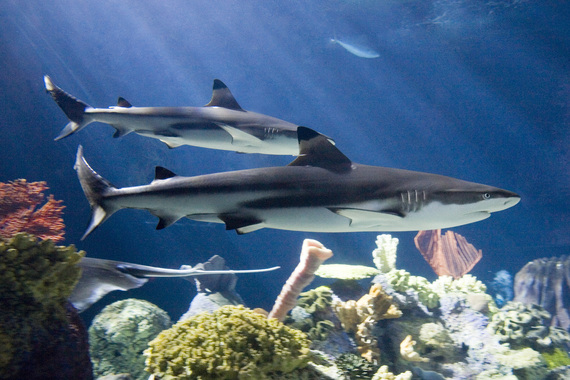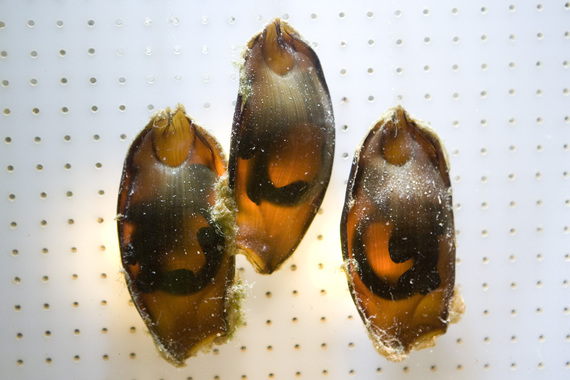It's amazing how much an animal can teach you.
That fact is very evident in my care for the eleven species of sharks at Shedd Aquarium, all of them fascinating, diverse and full of incredible biological traits that continue to give us the privilege of learning from. What's more amazing is caring for these animals as they carry out their natural reproductive cycle. With Shark Week in full swing, I want to shift the focus for a moment from the misunderstanding and sensationalized stories that sharks are dangerous, marauding predators laying wait just offshore to attack a human, and instead take a deeper dive into a subject I find infinitely more interesting- their capacity to be mothers.
Grasping the close relationship between sharks and the water in which they swim, whether at Shedd or in the wild, is important in understanding the type of pre-natal care we provide for them. Even as unborn babies, sharks are at one with the sea. When we think about shark babies, we have to respect how much diversity there is among shark species, as they all reproduce differently.
Some sharks are oviparous, or egg laying, like our bamboo sharks. These sharks typically deposit eggs containing a developing embryo in a case or shell. You might find these on a beach, which are commonly called a "mermaid purse." At Shedd, to monitor the health of these eggs before they hatch, we can shine a strong light through the case and actually see the developing embryo inside. The case or shell of the egg (which is quite tough) is actually not watertight, allowing the embryo to be bathed in the water around it. However, the resilient casing does help keep hungry or curious prey at bay in the wild, until the sharklette wriggles out. 
Blacktip reef sharks. ©Shedd Aquarium/Brenna Hernandez
Different sharks, like the blacktip reef shark that recently gave birth to pups at the aquarium, are viviparous; meaning, like humans they give birth to live babies. When we monitor the health of these babies before birth we sometimes use an ultrasound - a portable machine we have on site in the A. Watson III Armor Center for Aquatic Health and Welfare -- to look at them much the same way an obstetrician does for a human mom. To monitor the health of these babies before they hatch, in addition to ultrasound, we can shine a strong light through the case and actually see the baby inside. Visitors to the aquarium can often see this in the Wild Reef exhibit where our aquarists have a really cool egg exhibit that includes the same sort of light behind the egg.
Seeing this type of development helps us learn about how many pups they have, how big they are and how they develop throughout their critical growth protected by mom.
So, as tempting as it is to make sharks out to be blood-thirsty predators keen on threatening humans during Shark Week, let's take some time to appreciate what they really are - important marine species that play a vital role in the top-down maintenance of ocean ecosystems around the world. Globally, sharks are threatened with extinction largely due to overfishing (targeted and by-catch) and other unsustainable practices. If you want to learn more about Sharks at Shedd Aquarium, we have a wealth of resources on our website. We also invite you to visit the aquarium - we would love to change your mind about these amazing animals.
Bill Van Bonn, DVM, is Shedd Aquarium's vice president of animal health. With more than 25 years of clinical veterinary experience, Dr. Van Bonn strengthens the aquarium's established animal care and health expertise, overseeing its diverse aquatic medicine initiatives as well as furthering innovative veterinary science at Shedd. Dr. Van Bonn specializes in preventive medicine and enhanced clinical veterinary services for aquatic animals, with a focus on marine mammals. At Shedd, he focuses on providing top-quality care and applying his knowledge of animal health to conservation of their counterparts in the wild. He also oversees the aquarium's Microbiome Project.
